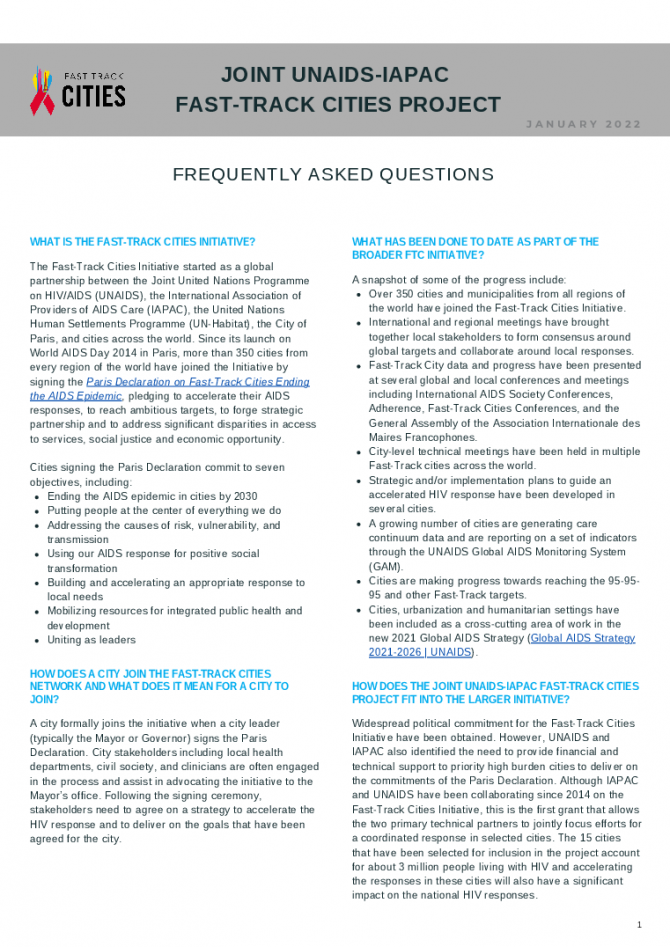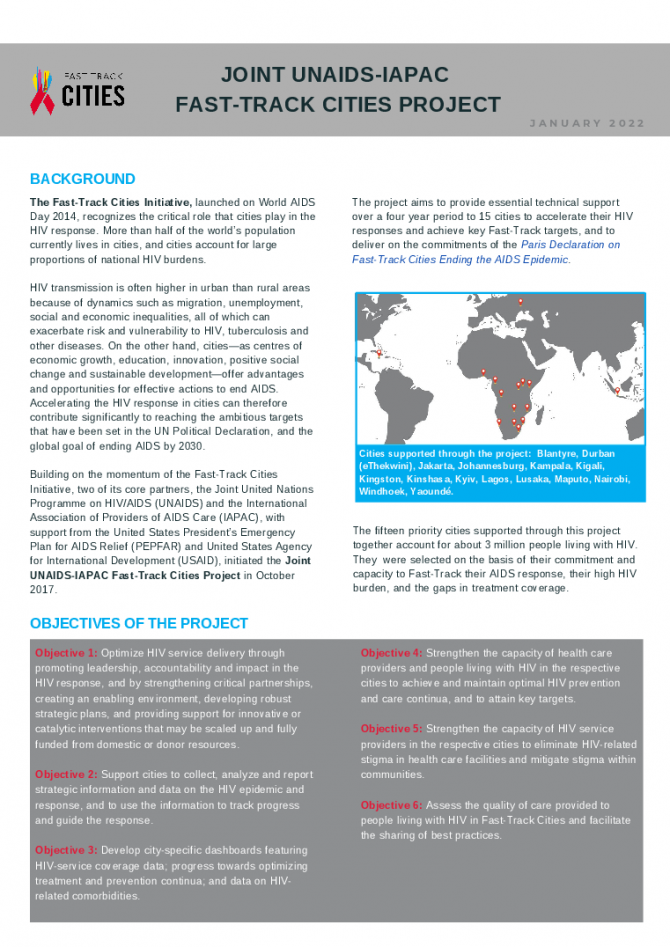
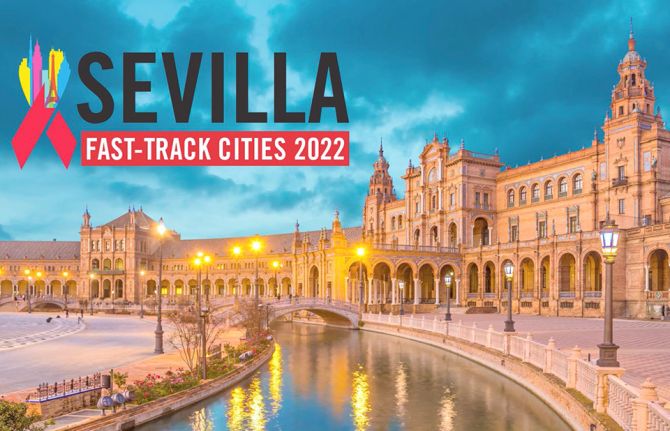
Feature Story
Sevilla Declaration on the centrality of affected communities in urban HIV responses unveiled at Fast-Track Cities 2022 conference
11 October 2022
11 October 2022 11 October 2022At a Fast-Track Cities 2022 conference reception held today in Seville, Spain, several Mayors and a Deputy Governor in attendance were joined virtually by peers from across the Fast-Track Cities network to sign their names to a declaration aimed at defining and facilitating the placement of affected communities at the center or urban HIV responses.
- The Mayors of Blantyre (Wild Ndipo), Kingston (Delroy Williams), Libreville (Issa Malam Salatou), Quezon City (Ma. Josefina Belmonte), and Sevilla (Antonio Muñoz Martínez) signed the Sevilla Declaration on the Centrality of Affected Communities in Urban HIV Responses (Sevilla Declaration) along with Johannesburg Mayor (Dada Morero), New York City Mayor Eric Adams, and other Mayors who participated via video or virtually.
- The Deputy Governor of the Bangkok Metropolitan Administration (Dr. Tavida Kamolvej) also affixed her signature to the declaration during the Sevilla ceremony, and a representative from GGD Amsterdam signed on behalf of that city’s Mayor (Femke Halsema). Multiple county and provincial officials from Fast-Track Cities in other countries also signed the declaration via video or virtually.
- Moreover, Mayors and representatives from an additional 22 Fast-Track Cities in Spain signed the declaration. Of note, the reception’s signing ceremony was witnessed by Carolina Darias, Minister of Health of Spain, in whose country more than 150 cities have joined the Fast-Track Cities network, with Sevilla having been the first Spanish city to sign the Paris Declaration on Fast-Track Cities Ending the HIV Epidemic in 2015.
According to Dr. José M. Zuniga, President/CEO of the International Association of Providers of AIDS Care and the Fast-Track Cities Institute, the Sevilla Declaration will supplement the Paris Declaration on Fast-Track Cities, which more than 400 cities and municipalities worldwide have signed since the network’s launch in 2014, thus joining the Fast-Track Cities network. The new declaration includes 10 commitments Fast-Track Cities are asked to make that range from safeguarding the dignity and rights of communities affected by HIV to meeting the United Nations goals for community-led HIV responses.
“An amorphous and overly malleable term such as ‘placing people at the center’ of the HIV response has little effect if it can be interpreted in a million different ways or worse actioned as mere tokenism that disenfranchises those whose voice at the table and leadership are critically needed,” said Dr. Zuniga. “The 10 commitments that Fast-Track Cities are making in signing the Sevilla Declaration reflect an important step forward in clearly defining, operationalizing, and facilitating what we mean by ‘placing people at the center’ of urban HIV responses at a time when it is most critical to do so.”
The Sevilla Declaration was shaped by organizations representing people living with HIV, including the Global Network of People Living with HIV (GNP+), as well as through regional listening sessions involving local communities of people living with HIV across the Fast-Track Cities network. Also providing input were the four core partners of the Fast-Track Cities initiative: IAPAC, the Joint United Nations Programme on HIV/AIDS (UNAIDS), United Nations Human Settlements Programme (UN-Habitat), and the City of Paris.
“The Sevilla Declaration provides structure for communities of people living with HIV to more formally play a leadership role in HIV responses at city and municipal levels,” said Sbongile Nkosi, Co-Executive Director of GNP+, which formally endorsed the declaration at the Fast-Track Cities 2022 conference. “We talk a lot about ‘placing people at the center of the HIV response,’ but the Sevilla Declaration does more by articulating commitments local governments and institutions must make to create the space for and empower people living with HIV and their community-based organizations to lead urban HIV responses.”
In its Global AIDS Strategy, 2021-2026, UNAIDS emphasizes the critical nature of community engagement and leadership to regain momentum against HIV that was lost during the COVID-19 pandemic. Through its advocacy on community engagement, UNAIDS has consistently stressed that the call for “nothing for us without us” must be made more than just a slogan.
“In line with the Global AIDS Strategy and the Sevilla Declaration, empowering and integrating community engagement is the cornerstone to ending AIDS and having people at the center of the response, said UNAIDS Deputy Executive Director for Programme, Eamonn Murphy.
Additional information from our partner
Related

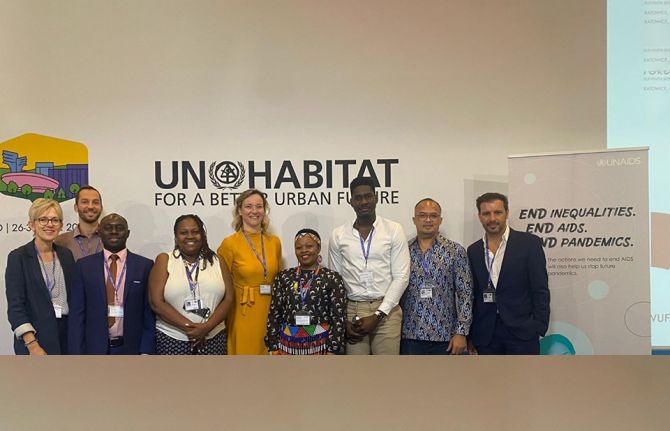
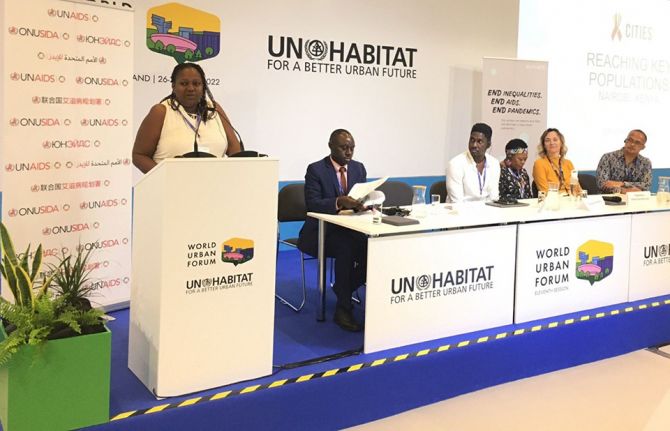
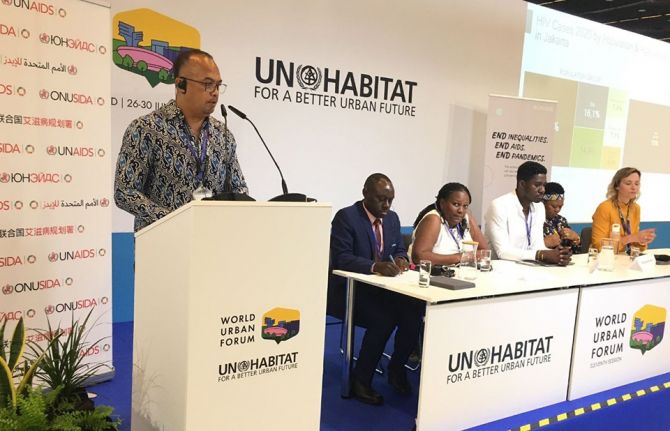
Feature Story
HIV on the agenda of the World Urban Forum in Poland
01 July 2022
01 July 2022 01 July 2022At the recent four-day World Urban Forum 11th Session (WUF11) in Katowice, Poland, more than 20,000 people gathered to discuss the impact of rapid urbanization on cities, economies, communities and policies. In an attempt to keep the HIV response and other health services in cities high on their agenda, UNAIDS, IAPAC and UN-Habitat co-organised a special session on Fast-Track Cities, focusing on innovation and the power of partnerships in accelerating the HIV response towards ending AIDS by 2030.
Eleanor Gouws, Senior Advisor at UNAIDS and Gonçalo Lobo, Vice-President at IAPAC, opened the session emphasizing the leading role cities have in addressing rights issues, reducing inequalities, protecting against risks and vulnerabilities, and keeping people healthier.
Five cities shared innovative examples to address HIV service gaps, more specifically how to reach key and vulnerable populations.
For example, in the municipality of eThekwini -Durban, South Africa, reaching and retaining in care young people infected with HIV remains a key challenge. A community-based project implemented in the high HIV burden district of Inanda, focuses on capacity building, peer education and support, as well as working with community leaders to reduce HIV-related stigma. Their goal has been to improve the uptake of HIV prevention, testing and treatment services among 10- to 35-year-olds. Close to 3,000 young people were reached and tested for HIV in the first six months of the project.
“A lot of effort has been put into building capacity of healthcare workers to ensure our project’s sustainability,” said Sibongile Mzulwini, Regional Manager at the National Association of Child [and Youth] Care Workers.
Similar efforts have been undertaken in Kenya. Since the city of Nairobi joined the Fast-Track Cities initiative, there has been a sharp increase in the number of clinics providing integrated care and drop-in centers where key populations and young people can access friendly and stigma free services. Testing uptake among young people increased by more than 5-fold between 2018 and 2021 in four informal settlements. Dr. Carol Ngunu, Deputy Director of Health at the Nairobi Metropolitan Services, highlighted the importance of, “understanding our local epidemics and gaps, knowing where the quick wins are and building ownership of communities in our local HIV responses.”
In Jakarta, Indonesia, artificial intelligence is leading the way to reach young people, notably men who have sex with men. With a reach of over 4 million people on social media in a seven-month period, Tanya Marlo, is an interactive mobile application in the form of a chatbot that gives HIV information and can also link users to a trained counsellor. “Tanya Marlo creates a bridge between the healthcare system and key populations at high risk of HIV infection,” said Tono Permana Muhamad, Program Director at the Kasih Suwitno Foundation. “These are people who usually do not access health services for fear of stigma and discrimination,” he said. The foundation currently manages the application to ensure its sustainability.
Stigma and discrimination also affect the HIV response in Kingston, Jamaica. As a result, the Jamaica Network of people living with HIV (JN+), with support from UNAIDS, is implementing a stigma-free spaces project to ensure that places of business, health, education, justice, entertainment and worship are respectful, inclusive and transformative. “We are building a stronger city HIV response in Kingston, thanks to the inclusion of communities through community-led responses and monitoring,” said Jumoke Patrick, the Executive Director of JN+.
Reporting from the host country’s perspective, Magdalena Ankiersztejn-Bartczak, President/CEO of the Foundation for Social Education in the capital city of Warsaw, which recently joined the Fast-Track Cities Initiative said that, “the influx of Ukrainian refugees in Poland had posed many challenges, including the continuity of life-saving treatment and support to people living with HIV.”
Despite the obvious challenges, Ms Ankiersztein-Bartczak said it has encouraged them to do more for people living with HIV and at high risk of HIV infection in Poland. “We count on the support of other Fast-Track Cities,” she said.
Concluding the session, the moderator, Robert Ndugwa from UN-Habitat, reminded participants that, “Cities face a myriad of challenges but also hold the key to solutions. They can act locally but influence globally.”
Related
 Government ensures continuity of treatment in Malawi
Government ensures continuity of treatment in Malawi

10 February 2025

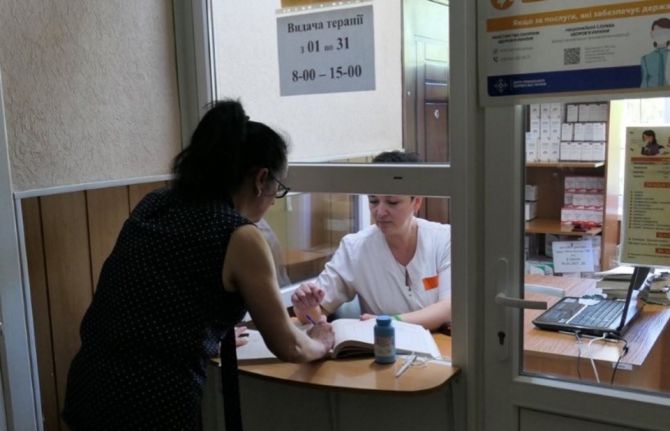
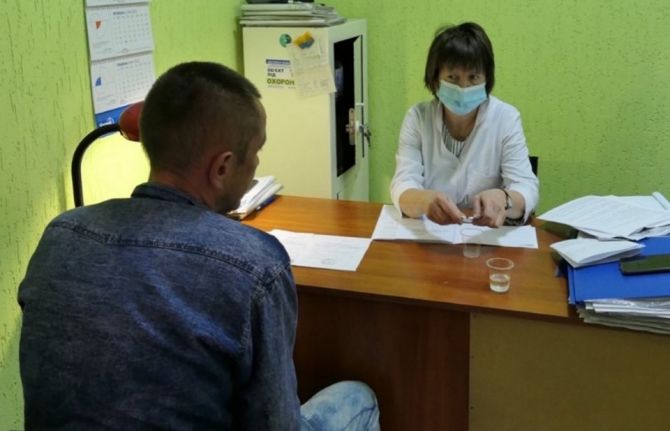
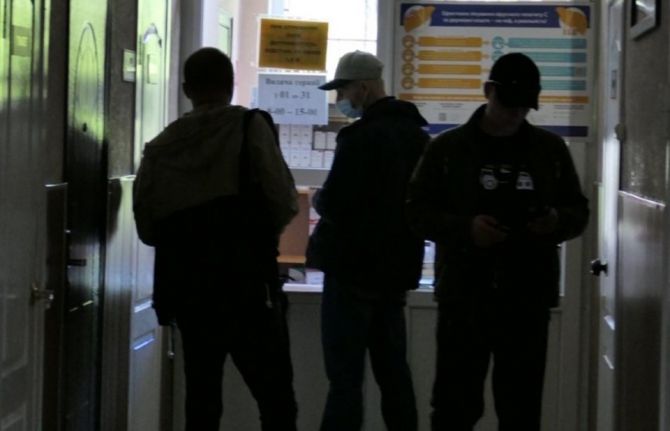
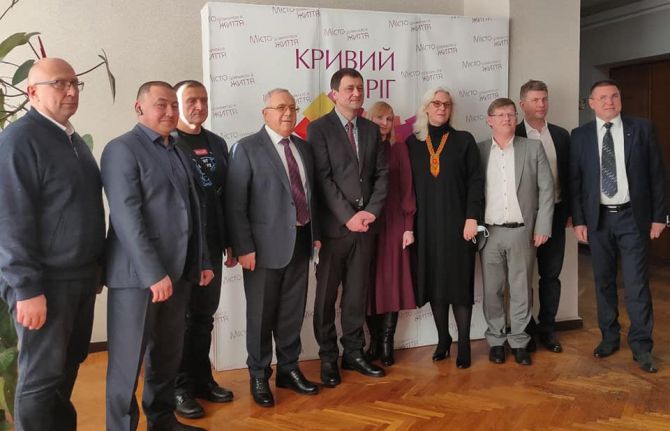
Feature Story
Kryvyi Rih AIDS centre continues to provide HIV services despite the war in Ukraine
25 May 2022
25 May 2022 25 May 2022On 25 November 2021, the city of Kryvyi Rih, the fourth largest city in Ukraine, signed the Paris Declaration to end the AIDS epidemic in cities. The city is an important economic and industrial centre, a major transport hub and the birthplace of the Ukrainian President, Volodymyr Zelensky.
A group created by the city administration to develop and implement the Paris Declaration determined the main areas of work, which included the expansion of HIV prevention services for key populations through community organizations and the scale-up of HIV testing through family doctors, among others.
Physicians across the city were trained in HIV, while Gennady Kruglenko, the chief doctor at the Kryvyi Rih municipal AIDS centre, visited Odesa and Dnipro to learn about their experience with implementing the Paris Declaration.
“We were seriously preparing to start this work,” said Mr Kruglenko. “But the war slowed down our plans. Our region borders the areas of active military operations, but our centre continues providing full-scale HIV services, and we are not going to stop. And we have not abandoned the main goal of the Paris Declaration: ending the AIDS epidemic.”
The Kryvyi Rih AIDS centre has been operating since 1994, and today there are about 10 000 people living with HIV accessing HIV treatment from it. People can get HIV treatment from five different sites, which makes it much easier for people living in different parts of Kryvyi Rih. Kryvyi Rih is the longest city in Europe, the length of which exceeds 120 km.
The AIDS centre continues to work as a reference laboratory for several regional centres. Its modern equipment allows the performance of all necessary tests, including diagnosis confirmation, CD4 counts, viral load and others, to be performed. People living with HIV with complex cases, for example opportunistic infections, that require the attention of experienced doctors are referred to the centre.
Marina Baidachenko, an infectious diseases doctor at the AIDS centre, says that the centre currently also provides services to people who have fled the war. “There are people who move within the country, who apply for services through a network of our social workers. The system in Ukraine is such that no matter where the patient is, he or she can receive treatment through the general system,” she said.
Each doctor providing specialized HIV care in Ukraine has access to the medical records of patients in a general electronic registry, with strict confidentiality measures in place. This ensures that the records of people living with HIV who move from one region to another can be accessed in the new region, thereby allowing the maximum number of displaced patients to remain on antiretroviral therapy, despite the war.
According to Ms Baidachenko, the war is felt every minute. “Air raids are very frequent, missiles are flying,” she said. The employees of the AIDS centre must go to the first floor or basement, which have been adapted as bomb shelters, every time the air raid siren sounds.
“To issue antiretroviral therapy to a person, you need to open his or her electronic card in the computer, create an electronic prescription through the registry and send it to the warehouse where the medicines are issued. When there are 200–300 patients in the centre, it’s hard to tell them to wait until the alarm is over,” said Ms Baidachenko.
With the help of a UNAIDS emergency grant, the centre equipped additional workplaces with laptop computers, office equipment and Wi-Fi. Now prescriptions take only minutes and doctors can move to a safe place when the siren sounds and take their computers and continue to serve people.
Close cooperation with community organizations, such as the Public Health Charity Foundation of Krivyi Rih, has become even more important during the war.
“Each of our doctors has about 2000 people on antiretroviral therapy. Now with the war, there are only two doctors left. They have to give a prescription, check the tests, explain the medical aspects—they simply don’t have time for other important issues, such as psychological support,” said Mr Kruglenko.
According to Alexander Lee, the Project Manager of the Public Health Charity Foundation, the war has changed the format and scope of the organization’s work. “Many of our clients were left alone with their problems and fears because family members left Ukraine. The response required increased mobility of the organization’s employees for consultations and assistance to clients in remote areas of the city,” he said.
Social workers are also helping to connect medical facilities with people who use drugs, gay men and other men who have sex with men and members of other communities, who have become even more vulnerable.
“Therefore, in the chain of services, everyone does a small, but very “big”, thing,” Mr Kruglenko added.
Raman Khailevich, the UNAIDS Country Director for Ukraine, emphasized that UNAIDS supports the city’s efforts to continue providing all HIV services in close cooperation with civil society organizations. “Such interaction in peacetime was one of the most important components of the successful AIDS response in Kryvyi Rih, and in wartime it is the only way not to lose what has been achieved but also to continue moving towards the goal of ending AIDS, saving every life,” he said.
Region/country
Related
 Women, HIV, and war: a triple burden
Women, HIV, and war: a triple burden

12 September 2025
 Displacement and HIV: doubly vulnerable in Ukraine
Displacement and HIV: doubly vulnerable in Ukraine

11 August 2025

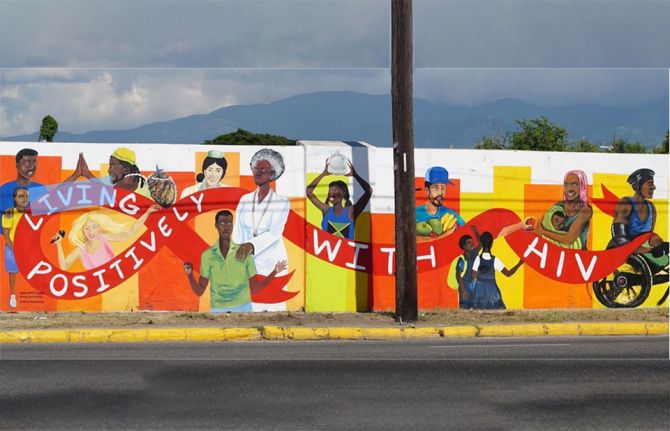
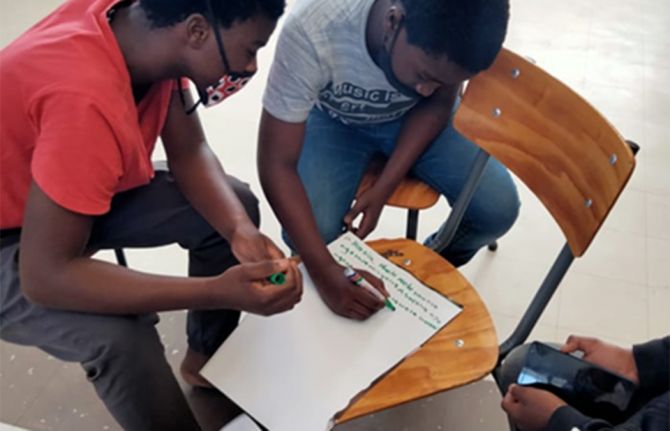

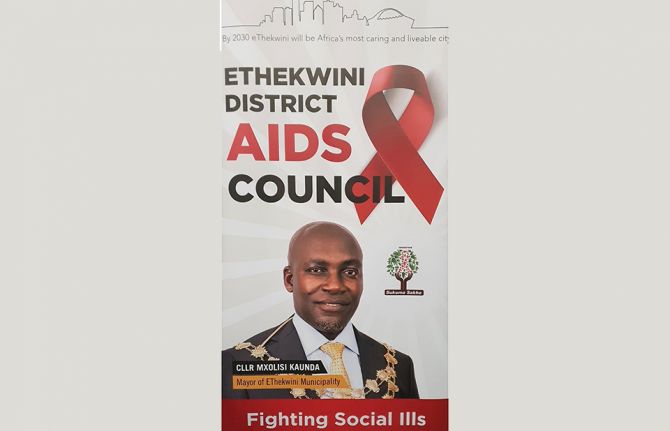
Feature Story
Four years of the Fast-Track cities project—what have we achieved and learned, and what is next?
21 February 2022
21 February 2022 21 February 2022Implementation of the joint UNAIDS–International Association of Providers of AIDS Care (IAPAC) Fast-Track cities project started in 2018 under the management of UNAIDS and IAPAC, with financial support from the United States Agency for International Development. Recognizing the important role that cities play in achieving national and global HIV targets and in ending AIDS by 2030, the project aims to provide essential and strategic technical support to 15 high-burden cities to accelerate their HIV responses. The 15 cities (Blantyre, eThekwini, Jakarta, Johannesburg, Kampala, Kigali, Kingston, Kinshasa, Kyiv, Lagos, Lusaka, Maputo, Nairobi, Windhoek and Yaoundé) account for about 3 million people living with HIV. The project is implemented in close collaboration with local governments and stakeholders and takes into account the local contexts, epidemics and priorities. Technical support is provided for the development and implementation of city HIV strategic plans, creating an enabling environment for optimized HIV service delivery, strengthening data collection, analysis and use and building clinician and community capacity to facilitate service optimization and to eliminate stigma in health-care facilities.
Implementation over the past four years has achieved important results and led to significant changes at the city level. With the sustained support and commitment of mayors and city leaders, the project has catalysed action at various levels. Improved coordination, strengthened partnerships, civil society engagement and innovation to reach key and vulnerable populations have led to an increased uptake of HIV services, and cities have showed leadership during the COVID-19 pandemic to ensure that services continued to be delivered. Improved strategic information and monitoring and evaluation systems are now allowing cities to track the HIV response and to report on their epidemics. Close to 10 000 people have been reached with IAPAC-led training activities.
During a recent UNAIDS webinar, UNAIDS country staff providing support to four of the participating cities shared some of their experiences.
The city of Kingston, Jamaica, home to 35% of all people living with HIV in the country, is implementing activities to address some of the remaining challenges related to laws and policies that have affected society.
“One of the routes that we have taken through the Fast-Track cities project is to work more closely at the community level, as this is where we see the biggest challenge related to stigma and discrimination,” said Ruben Pages Ramos, UNAIDS Community Support Adviser for Jamaica.
In an attempt to address stigma, UNAIDS, in partnership with the Jamaica Network of People Living with HIV, initiated stigma-free spaces to sensitize the public and to ensure that places of business, health, education, justice, entertainment and worship are respectful, inclusive and transformative. Kingston municipality has been declared as the first stigma-free space in Jamaica and the mayor is committed to make Kingston a stigma-free city.
In eThekwini (Durban), South Africa, the National Association of Child Care Workers was contracted as part of a community project to support children and young people in Inanda, the largest township in Durban. The main objective was to reach children and young people with HIV services, ensuring that people living with HIV remain in care, and to address stigma in the community.
“This catalytic project achieved amazing results, and if taken to scale we could do amazing things,” said Miriam Chipimo, UNAIDS Fast-Track Adviser, South Africa.
Key results during a short, five-month, period of implementation included the initiation of four community action groups for young people to provide counselling and behaviour change communication support, reaching close to 2500 young people with HIV testing services (with people who are HIV-positive initiated on antiretroviral therapy), while close to 2000 community members were reached with anti-stigma messages on HIV, tuberculosis and COVID-19.
Through the mayor’s office and the department of health, key stakeholder engagement and linkages to United States President’s Emergency Plan for AIDS Relief and community-based organization activities in Inanda were also supported.
In Lusaka City, Zambia, the Fast-Track cities project has been catalytic in strengthening the coordination mechanisms for a multisectoral approach to the HIV response in the city. Lusaka has established a Project Technical Committee with representation from the District HIV and AIDS Committee, the District Medical Team, civil society, HIV implementing partners, networks of people living with HIV and the Key Population Consortium.
“Given the legal environment in Zambia, it’s very difficult to bring the lesbian, gay, bisexual, transgender and intersex and sex worker communities to the table, but under the Lusaka City Fast-Track project they have been brought together and they engage with civic leaders, the management teams and various stakeholders,” said Kenneth Mwansa, UNAIDS Community Support Adviser for Zambia.
Recognizing the need for innovative approaches to reach populations at higher risk of HIV, Lusaka City has also established and capacitated an Innovations Team, with representation from sex workers, lesbian, gay, bisexual, transgender and intersex people, people living with HIV and adolescent and young women organizations.
Linked to the development of a five-year strategic action plan to guide the city’s HIV response, a functional monitoring and evaluation unit was established, for the first time in the city, to coordinate HIV data collection at the district level and to better monitor the HIV epidemic and response.
Coordination of the HIV response in Kampala, Uganda, has improved owing to the full functionality and involvement of the Division AIDS Committee, while strong partnerships have been built with the Kampala Capital City Authorities (KCCA) and the Alliance for Mayors and Municipal Leaders on AIDS in Africa.
As part of the activities to reach and engage key populations and young people in Kampala, maps were produced on key population-friendly HIV services within the city, and a mobile app was launched in 2021 to increase the uptake of HIV prevention and treatment services among key and vulnerable populations. KCCA staff and key population representatives participated in the development of the app and were trained in its use. The app is hosted on the official city website to ensure sustainability. “In addition to the mapping of services, the app includes a section on recommendations and review of services. It also provides information by type of services, such as pre-exposure prophylaxis, for example,” said Tseday Alemseged, from the UNAIDS Country Office for Uganda.
Additionally, activities are ongoing in Kampala to sensitize the community around HIV prevention, vulnerability to severe COVID-19, equity and stigma and discrimination.
Good practices and strategic information from the other participating cities are being published on the Fast-Track cities interactive map, available at https://fasttrackcitiesmap.unaids.org/.
The project will continue until mid-2023. Lessons learned from the project will be used to inform the development of an action framework to guide and support the HIV response in urban settings, in line with the Global AIDS Strategy 2021–2026: End Inequalities, End AIDS.
Resources
Related
Documents
2021 UNAIDS Global AIDS Update — Confronting inequalities — Lessons for pandemic responses from 40 years of AIDS
14 July 2021
UNAIDS report shows that people living with HIV face a double jeopardy, HIV and COVID-19, while key populations and children continue to be left behind in access to HIV services. Read the press release | Data slides | This document is also available in Arabic

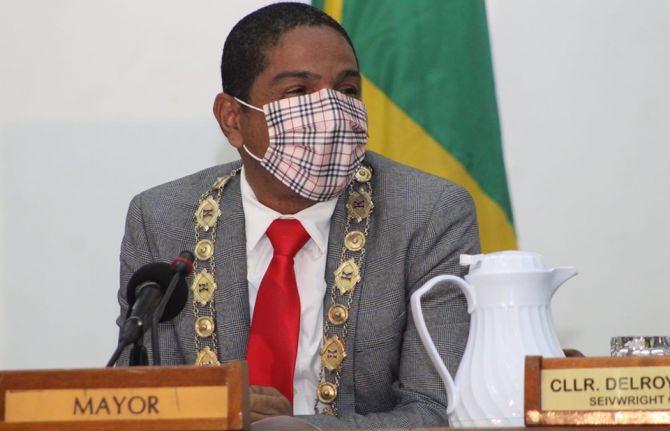
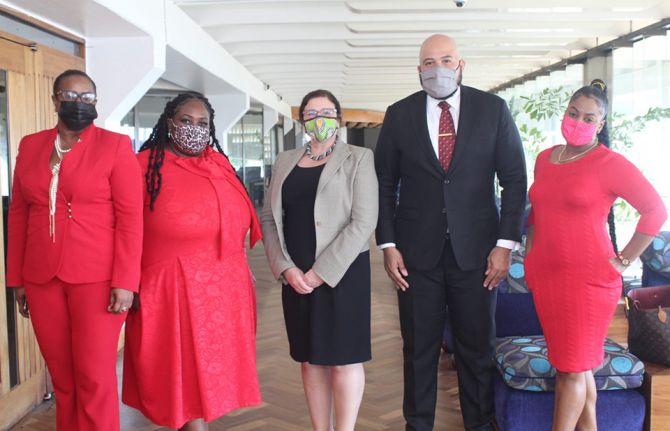
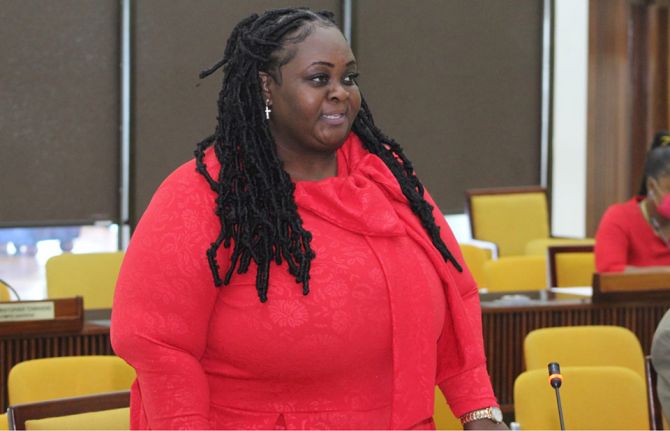
Feature Story
Kingston declares World AIDS Day as a commemorative day of public interest
10 November 2021
10 November 2021 10 November 2021A resolution calling on the Kingston and Saint Andrew Municipal Corporation to declare World AIDS Day as a commemorative day for the City of Kingston, received unanimous approval by the City’s Councilors today.
The resolution, which reaffirms Jamaica’s commitment with the Sustainable Development Goals, the Fast Track City Initiative, and the 2021 Political Declaration on HIV and AIDS: Ending Inequalities and Getting on Track to End AIDS by 2030, resolves that on December 1st of every year, the City of Kingston, in partnership with the public and private sector and affected communities, will commemorate World AIDS Day.
The Mayor of Kingston, Senator Councilor Delroy Williams lauded the resolution as an important step towards transforming Kingston into a stigma-free city. “This resolution stems from a commitment by the Municipality to keep contributing to the end of AIDS, which will only be possible if we effectively tackle the root causes, including stigma, discrimination, and violence that put Jamaicans at risk of acquiring HIV and not adhering to their medications”, stated Mayor Williams.
Acknowledging that “ending discrimination, stigma and marginalization will result in more persons getting tested, accessing treatment and reducing HIV in the municipality”, the resolution further resolves that “events be held each year within the Municipality of Kingston and St Andrew to raise awareness and to end discrimination, stigma, and HIV related violence”.
According to Jamaica’s latest People Living with HIV Stigma Index, launched in 2020, a third of people living with HIV have experienced at least one form of stigma and/or discrimination due to their HIV status in the last 12 months. Furthermore, more than half of the participants reported experiencing self-stigma, and the majority expressed that they find it difficult to tell others about their HIV status.
“Strong partnerships and commitments from local governments are critical to enhance our efforts to end discrimination. As we continue to work towards an equitable and enabling Jamaica for our brothers and sisters living with HIV who continue to be marginalized, I am heartened and welcome this move by the Municipality, led by the Mayor. The passing of this declaration brings awareness and local buy-in,” stated Jumoke Patrick, Executive Director of JN+.
Manoela Manova, UNAIDS Country Director, highlighted these commitments are a step in the right direction. “We have a lot of work to do to end inequalities, discrimination, and AIDS. The commitment shown by the Municipality and the Councilors, through the passing of this resolution, are both a gesture of solidarity and leadership that must be nurtured and replicated across all levels of government.”
Region/country
Related

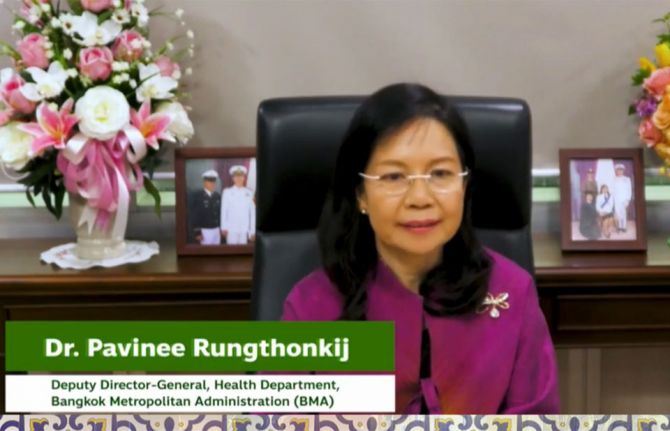
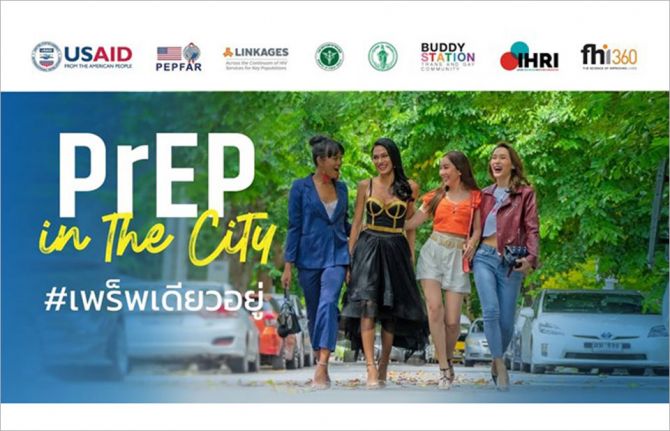
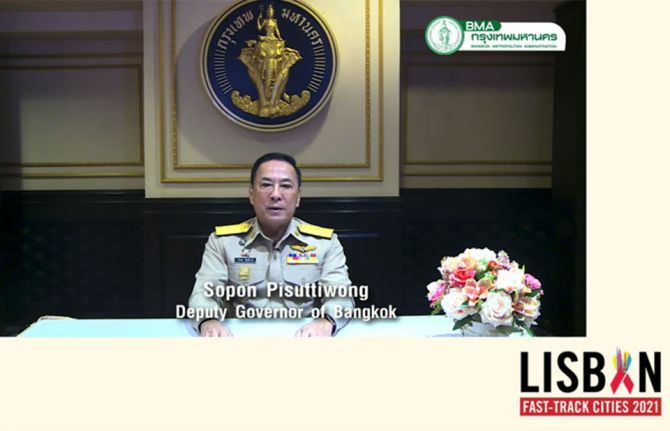
Feature Story
Bangkok Metropolitan Administration receives award for innovations on PrEP and key population-led services
28 October 2021
28 October 2021 28 October 2021The Bangkok Metropolitan Administration (BMA) in Thailand has been awarded the inaugural Circle of Excellence Award at the Fast-Track cities 2021 conference, held recently in Lisbon, Portugal. The Circle of Excellence Award showcases outstanding work in fast-tracking the HIV response and advancing innovative programming to end the AIDS epidemic in cities by 2030.
“To receive the Circle of Excellence Award for Bangkok is a great honour. It demonstrates not only the past achievements but, moreover, the future commitment to accelerate the HIV response and towards ending AIDS in Bangkok. We are proud that innovations have produced remarkable results, particularly same-day antiretroviral therapy and key population-led health services, such as specialized and holistic services for transgender people and the scale-up of pre-exposure prophylaxis (PrEP) programmes. These innovations are not only applied in Bangkok but have become models for the region,” said Parnrudee Manomaipiboon, the Director-General of the Department of Health, BMA, during the award ceremony.
Organized by the International Association of Providers of AIDS Care, in collaboration with UNAIDS, the Fast-Track Cities Institute and other partners, the Fast-Track cities conference highlighted successes achieved across the Fast-Track cities network, addressed cross-cutting challenges faced by local stakeholders and shared best practices in accelerating urban HIV, tuberculosis and hepatitis B and C responses.
“Bangkok has put in place a 14-year strategic plan for ending AIDS from 2017 to 2030, which is under the leadership of the Bangkok Fast-Track Committee,” said Pavinee Rungthonkij, the Deputy Director-General, Health Department, BMA. “During COVID-19, BMA and partners have introduced innovations such as multimonth antiretroviral therapy, an express delivery of antiretroviral therapy service, sexually transmitted infection self-sampling and PrEP,” she added. Among other achievements, Bangkok has expanded its PrEP services to 16 municipal public health centres and eight city hospitals and implemented citywide awareness campaigns. PrEP in the City was the first citywide PrEP campaign focusing on transgender people in Asia.
“Significant progress has been made in the HIV response since Bangkok joined the Paris Declaration to end the AIDS epidemic in cities in 2014. It shows that mutual commitments and a strengthened partnership between stakeholders at all levels are key to an effective HIV response. Bangkok will continue to leverage support, scale up innovations and Fast-Track solutions to achieve the 2025 targets and end AIDS by 2030,” said Patchara Benjarattanaporn, the UNAIDS Country Director for Thailand.
Our work
Region/country

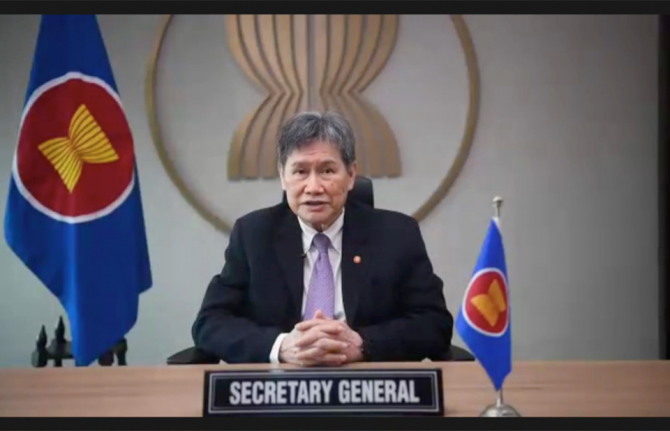
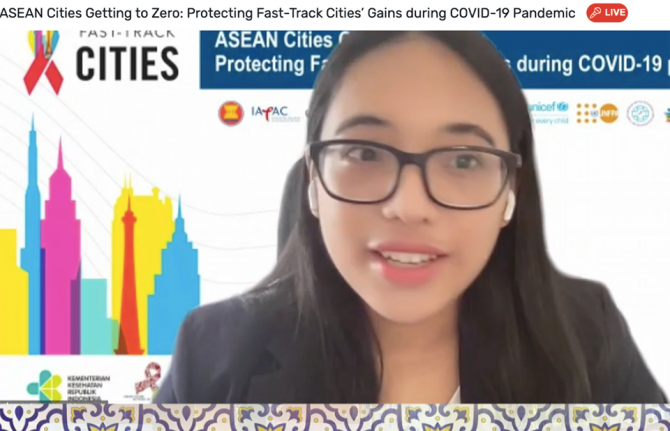
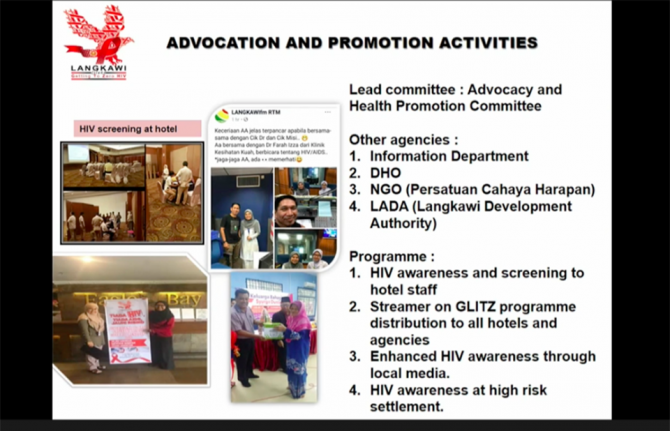
Feature Story
ASEAN cities protecting the gains of the HIV response during the COVID-19 pandemic
26 October 2021
26 October 2021 26 October 2021Fast-Track cities in South-East Asia have been stepping up efforts during the COVID-19 pandemic to ensure that HIV treatment and prevention services remain unaffected by the pandemic and to protect the gains made in the HIV response. The dynamic city-based infrastructures that have been built up around the HIV response are being leveraged to implement innovative programmes to safeguard people living with HIV and other vulnerable populations and contain the spread of COVID-19.
Jakarta, Indonesia, provides a clear example of how cities are accelerating their HIV responses, enabling continued progress while taking into account the effects of the COVID-19 pandemic. Since the first COVID-19 outbreak, Central Jakarta, with more than 10 000 people living with HIV on antiretroviral therapy, ensured treatment continuity with the implementation of multimonth antiretroviral therapy dispensing and community-led home-based delivery. In collaboration with partners, the Provincial Health Office of Jakarta developed the Jak-Anter service, which connects people living with HIV with health facilities across the metropolitan area, allowing for direct client-organized antiretroviral therapy delivery, benefiting nearly 30% of people living with HIV in the area.
This best practice was shared at an event, ASEAN Cities Getting to Zero: Protecting Fast-Track Cities’ Gains during the COVID-19 Pandemic, which brought together five cities from the Association of Southeast Asian Nations (ASEAN) on the margins of the Fast-Track cities 2021 hybrid conference in Lisbon, Portugal, on 21 October.
“Cities play a critical role in delivering on the United Nations Political Declaration on AIDS. As we make our collective steps towards the next phase of achieving the three zeroes, we must work in partnership to address the variety and complexity of HIV epidemics. Evidence-informed national regulations will ensure effective collaboration between national and subnational governments,” said Budi Gunadi Sadikin, the Minister of Health of Indonesia.
The event allowed ASEAN cities to share innovative practices in implementing HIV programmes amid the COVID-19 pandemic.
“ASEAN is committed to fast-tracking the HIV response to end AIDS by 2030. We must continue to work hand in hand and to ensure equitable access to HIV services and solutions, break down barriers and improve resource mobilization for efficient and sustainable HIV responses,” said Dato Lim Jock Hoi, the Secretary-General of ASEAN.
A recurring theme during the session was how quickly ASEAN cities utilized virtual platforms to scale up access to HIV services, especially during lockdowns. In the Philippines, Pasig City delivered quality services to key populations by increasing investments in HIV programmes and treatment facilities and the use of virtual platforms. Like Jakarta, Pasig City partnered with community-based organizations to deliver antiretroviral therapy, condoms and lubricants by establishing a service delivery network with service providers and health facilities to provide core packages of health-care services during the COVID-19 pandemic.
Can Tho, a city in Viet Nam, piloted a project to deliver self-test kits to key populations, in particular gay men and other men who have sex with men and people who use drugs, through virtual platforms. In collaboration with the World Health Organization and civil society partners, Can Tho quickly responded to COVID-19 by training community outreach workers to conduct community-based HIV rapid testing and by scaling up HIV self-testing.
Bangkok’s innovations included same-day delivery of antiretroviral therapy and the scale-up of key population-led health services. Bangkok, a regional leader in pre-exposure prophylaxis (PrEP) and a provider of specialized and holistic services for transgender people, expanded its PrEP services to 16 municipal public health centres and eight city hospitals during the COVID-19 pandemic.
Young people were noted as being at the forefront of the HIV response in ASEAN cities. In an effort to reduce the number of new HIV infections among young people in Langkawi, Malaysia, the Kedah State Health Department established the GLITZ project. The programme focuses on young people, including young key populations, through various outreach activities, mentor–mentee programmes and school and university visits to educate young people on HIV prevention.
As the Fast-Track cities network continues to grow in the ASEAN region, the complexity of HIV in urban areas is better understood. The network offers a way for cities to share best practices and experiences at a time of increasing urbanization and globalization.
“It has been 10 years since the ASEAN Cities Getting to Zero project was initiated. Since then, the project has successfully expanded to 76 cities in the region. As we see more participating cities and significant signs of progress in the HIV response, I encourage avenues for South–South collaboration. Together, in partnership, we can end AIDS as a global health threat by 2030,” said Taoufik Bakkali, the Director, a.i., of the UNAIDS Regional Support Team for Asia and the Pacific.
Our work
Region/country
- Asia and Pacific
- Australia
- Bangladesh
- Bhutan
- Brunei Darussalam
- Cambodia
- China
- Democratic People's Republic of Korea
- Federated States of Micronesia
- Fiji
- India
- Indonesia
- Islamic Republic of Iran
- Japan
- Kiribati
- Lao People's Democratic Republic
- Malaysia
- Maldives
- Marshall Islands
- Mongolia
- Myanmar
- Nauru
- Nepal
- New Zealand
- Pakistan
- Palau
- Papua New Guinea
- Philippines
- Republic of Korea
- Singapore
- Solomon Islands
- Sri Lanka
- Thailand
- Timor-Leste
- Tonga
- Tuvalu
- Vanuatu
- Viet Nam
- Samoa





